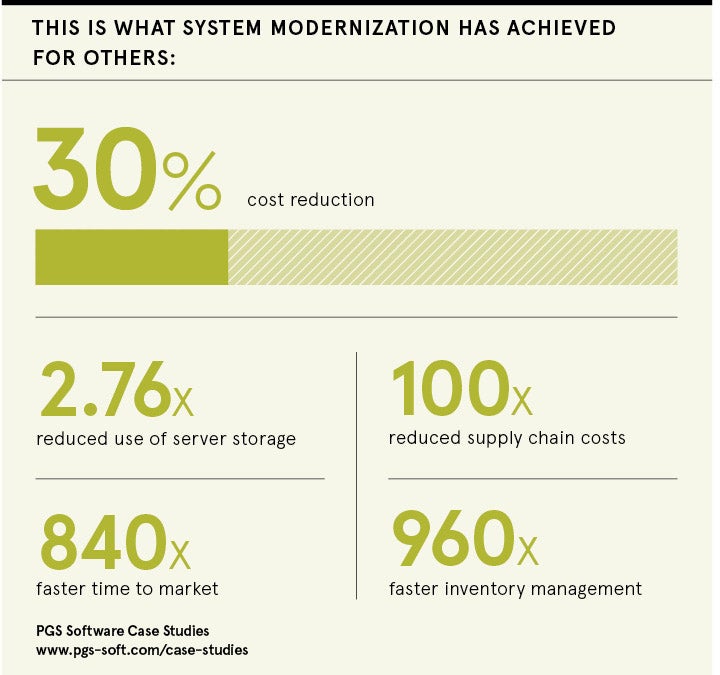
The rapid pace of innovation in recent years, accelerated further by the coronavirus pandemic, has made agility an essential currency for thriving and surviving in the digital age. To eradicate the legacy preventing them from adapting to change at the same pace as natively agile startups, organisations are embracing development and deployment methods.
Modern technologies not only enable agility and cost reductions compared with legacy infrastructure, but also the ability to innovate without barriers and fail fast, which is a crucial facet of gaining competitive advantage. Supported by powerful architectures and development approaches, such as microservices, automation, and continuous integration and continuous delivery, or CICD, it is much easier to experiment and deploy new features.
Modern technologies not only enable agility and cost reductions compared to legacy infrastructure, but also the ability to innovate without barriers and fail fast
“Legacy systems lack that agility since they involve, in most cases, one big monolithic application that has been developed over ten or fifteen years,” says Rafał Jasiński, senior business analyst at IT service provider PGS Software. “It’s big, it’s complex and therefore it takes time to build something new and test it. Time to market can take six months or more; with a modernised approach, we can reduce this to as little as three weeks.”
While the benefits are clear, the modernisation journey isn’t necessarily a smooth one. According to McKinsey research, 70 per cent of digital transformations fail, often because companies are not specialised in cloud migrations and integrations. Those that do succeed typically lean on partners with the expertise in modernising infrastructure.
PGS Software is one such partner, with expertise and services stretching across cloud computing, transformation and data science, including business analysis, user experience and quality assurance. Through its software development services, which are crafted to the needs of each client, PGS Software converts ideas companies have into quality IT solutions.
“We support clients through the whole journey,” says Jasiński. “We assist in carefully planning modernisation and migration, rearchitecting solutions and decomposing into microservices or other cloud-native architectures like serverless. Crucially, our teams help clients to build new products and features, all the while allowing them to learn from us as cloud specialists, and therefore become cloud experts themselves through that process.”

When AIXBRO, a leading supplier of automotive parts, wanted to improve its online database and search functionality, it turned to PGS Software to build a new prototype in the cloud. An AWS Managed Services deployment enabled AIXBRO to accelerate inventory management by 960 times, from taking up to 80 hours to populate around half a million products, to completing the same tasks in mere minutes and with limitless scalability.
“Not only have we modernised our means of managing our extensive inventory, but PGS Software has also shown us a future-proof solution that will stay with us as we grow and transform,” says Stefan Hilbrich, director of ecommerce at AIXBRO. “We now have a frustration-free solution as the basis for multiple new features that’ll transform our company even further.”
Another PGS Software customer, online business directory Yell, increased its time to market by 840 times thanks to a whole new digital engagement model, underpinned by the cloud. A fintech client, meanwhile, was able to reduce its costs by 30 per cent through a cloud-native development strategy, which accelerated the introduction of new features by 869 per cent.
In the future, companies are going to use more cloud services, especially managed services, as they seek fast, accessible and approachable ways of leveraging the benefits and agility. Crucially, managed services enable companies to quickly experiment with artificial intelligence and machine-learning algorithms, something that would take then much longer to do on their own.
“To run a big data project on-premise, you have to buy very expensive, high-performance computers. You don’t know when, or even if, you’ll get a return on that,” says Jasiński. “Companies are realising they can use cloud services for this. While there is still a cost to the computing power, if you are disappointed with the outcome of the experiment, you can just shut it down, which is crucial to the ability to innovate and improve decision-making.”
For more information please visit pgs-soft.com
Promoted by PGS Software

The rapid pace of innovation in recent years, accelerated further by the coronavirus pandemic, has made agility an essential currency for thriving and surviving in the digital age. To eradicate the legacy preventing them from adapting to change at the same pace as natively agile startups, organisations are embracing development and deployment methods.
Modern technologies not only enable agility and cost reductions compared with legacy infrastructure, but also the ability to innovate without barriers and fail fast, which is a crucial facet of gaining competitive advantage. Supported by powerful architectures and development approaches, such as microservices, automation, and continuous integration and continuous delivery, or CICD, it is much easier to experiment and deploy new features.
Modern technologies not only enable agility and cost reductions compared to legacy infrastructure, but also the ability to innovate without barriers and fail fast

